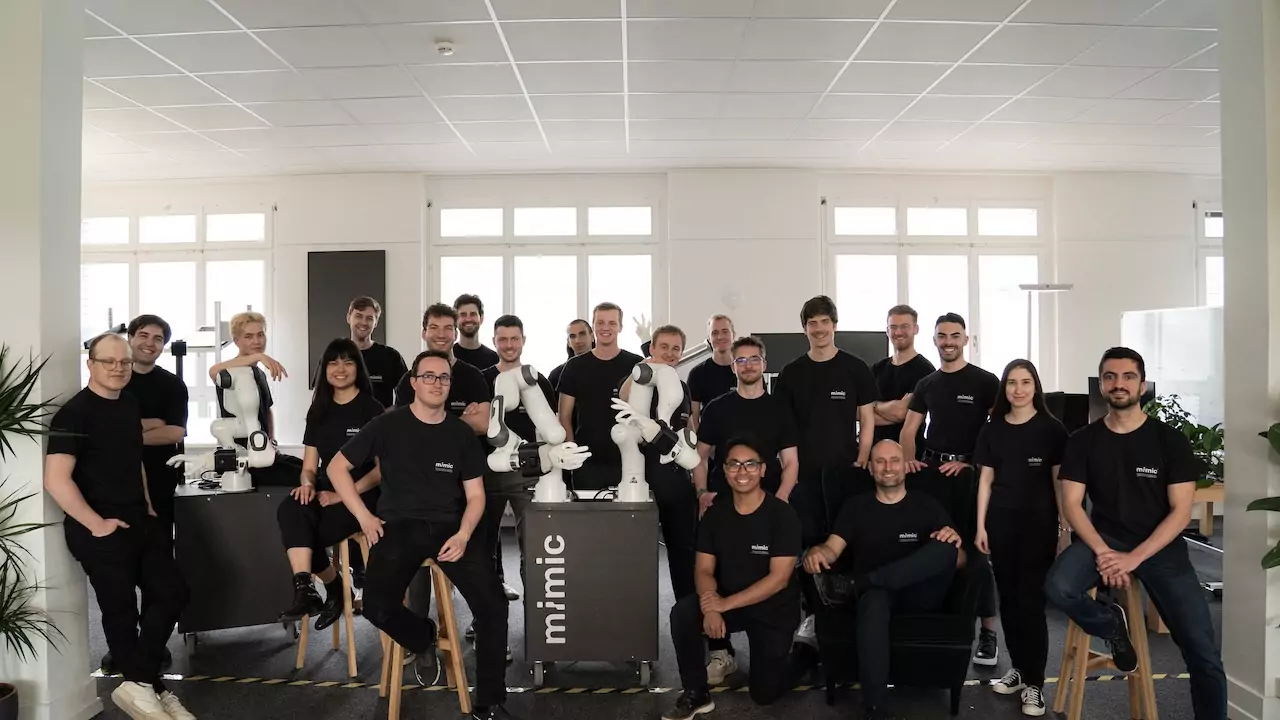Mimic, a Zurich-based robotics company, has announced that it has raised $16 million in a round led by Elaia, together with Speedinvest, to implement its cutting-edge physical AI across all industrial sectors, enabling robots to perform complex and delicate tasks that conventional machines are unable to perform.
Founderful, 1st kind, 10X Founders, 2100 Ventures and Sequoia Scout Fund also participated in this oversubscribed seed funding round, bringing Mimic’s total funding to over $20 million. The new capital will accelerate the development of Mimic’s core artificial intelligence model and humanoid robotic hands, and promote implementation with leading global industry players.
In factories around the world, millions of complex manual tasks still depend on human skill. These tasks remain beyond the reach of traditional automation in sectors such as manufacturing, assembly and logistics. With growing labour shortages and the reshoring of production by industries amid global uncertainty, the need for versatile and intelligent robots has never been more apparent. Traditional robots excel at repetitive, pre-programmed movements in controlled environments, but require costly custom configurations and coding for each task. At the same time, the race to build humanoid robots has attracted billions in investment, driven largely by US and Chinese companies, but their adoption remains very limited.
Concerns about safety and regulations, high costs and limited dexterity have slowed their adoption in the real world. “Humanoids are exciting, but there aren’t many industrial scenarios where the full-body form factor really adds value,” says Stephan-Daniel Gravert, co-founder and CPO of Mimic, in a statement. Our approach combines skilled robotic hands guided by artificial intelligence with proven, commercially available robotic arms to offer the same capabilities in a much simpler, more reliable and rapidly deployable manner.
Mimic builds cutting-edge physical models of artificial intelligence, trained on real-world human demonstrations, using innovative methods to overcome the problem of data scarcity in robotics. Skilled operators wear Mimic’s proprietary data collection devices while performing their daily work in factories, capturing detailed movement data from real production environments without disrupting operations. These demonstrations are then used to train AI models through imitation learning, enabling Mimic’s humanoid robotic hands to reliably reproduce human technique. The company’s physical AI models ensure that robots react autonomously to changes in the position and orientation of objects, handle disturbances and self-correct their actions, operating seamlessly in environments designed for humans.
“Our general-purpose AI models allow us to automate manual labour in ways that were previously impossible,” says Elvis Nava, co-founder and CTO of Mimic. “Thanks to our unique focus on human-like dexterity and human data, we are competitive both at the basic robot model level and at the application level.”
The labour markets of industrial economies are under constant pressure. An ageing workforce, rising production costs and efforts to reduce dependence on global supply chains are driving a shift towards reshoring and automation. Analysts predict that the global market for humanoid and precision robotics alone could reach $38 billion by 2035, within a broader robotics market estimated to be worth between $200 billion and $1 trillion by 2040. Mimic is partnering with leading multinational industrial and logistics service providers and is seeing strong customer demand in many other labour-intensive industries.
Founded in 2024 as a spin-off from ETH Zurich, Mimic brings together a multidisciplinary team of 25 engineers, researchers and practitioners (pictured). Over the past year, the company has secured non-dilutive funding from the Swiss Federal Innovation Agency and was selected for the AWS Generative AI Accelerator, a programme that supports early-stage companies applying advanced artificial intelligence to real-world challenges.
“We are at a turning point in robotics, where learning-based systems meet real industrial needs,” says Stefan Weirich, co-founder and CEO of Mimic. “We make dexterity implementable on a large scale, bridging the gap between what AI can do in the laboratory and what factories actually need.” Europe has the talent, the infrastructure and the demand, and we are building the company that brings all of this together.
Clément Vanden Driessche, partner at Elaia, says: “Elaia is thrilled to lead the seed investment round in Mimic. Mimic’s world-class team is tackling one of the most challenging problems in physical AI: dexterous manipulation. Mimic’s innovative approach integrates a proprietary robotic hand, state-of-the-art basic models for robotics, and innovative methods of data acquisition and training.
Vincent Faber, investment manager at Elaia, adds: “This enables autonomous and versatile manipulation and unlocks a previously unexplored segment of the automation market, where demand for flexible solutions continues to grow.”
Andreas Schwarzenbrunner, general partner at Speedinvest, states: “At Speedinvest, we have always believed that Europe’s strength lies in combining world-class engineering with basic research. With Mimic, we see exactly that: a platform that unlocks human-level dexterity with cutting-edge artificial intelligence and solves billion-pound problems in today’s factories. This is the moment when Europe steps up to compete and lead the new era of artificial intelligence and robotics.
ALL RIGHTS RESERVED ©
